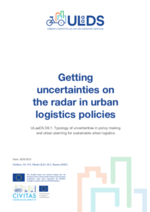
Edinburgh (United Kingdom)
Edinburgh is a city of 468,000 inhabitants, located in Scotland, the United Kingdom. It is the second largest Scottish city, after Glasgow, and lies 65 km east of Glasgow. It is well known as the home of famous writers and actors (Sir Arthur Conan Doyle, Ian Rankin and J. K. Rowling).
According to data in the city’s most recent local transport plan, for 2007-2012, the modal split for journeys by Edinburgh residents was 54 percent for cars, 23 for walking, 19 percent for public transport and 2 percent each for cycling and “other.”
As indicated in the local transport plan, Edinburgh’s City Council has adopted a vision for transport that focuses on sustainability. The plan states that the city’s transport system should not only foster economic prosperity but also “contribute to better health, safety and quality of life of all Edinburgh’s citizens and visitors, particularly children, the elderly and disabled people.”
The vision further states: “The Council will seek to maximize people’s ability to meet their-day-to-day needs within short distances that can easily be undertaken without having to rely on a car. The city should develop and grow in a form that reduces the need to travel longer distances. Choice should be available for all journeys within the city.”
Positive steps towards sustainable transport, as cited in the local transport plan, include:
- construction of two new stations for its suburban rail system, CrossRail;
- building of a park& rides at Newcraighall and at Ingliston and Hermiston;
- opening of the Edinburgh Park Rail Station;
- establishment of the Straiton - Leith quality bus corridor;
- launching an extensive programme of Safer Routes to Schools; and
- widespread provision of 20 mph zones.-
Data shows that Edinburgh streets have became safer, with a significant drop in the rate of serious accidents from 1999 to 2004. Modal shares for biking and walking held steady during this period while the shares in Scotland as a whole fell.
A major disappointment for city leaders was the failure in February 2005 of a referendum for a road-user charge. This was deemed a major setback for efforts to stem traffic congestion in the city. However, there are high hopes for a project to reintroduce trams to Edinburgh, a scheme that will cost an estimated GBP 600 million. Originally scheduled to begin service in 2011, the system is forecast now to launch in 2014. When the first east-west line begins service, it will be the first time trams have run in Edinburgh since 1956.
Edinburgh’s transport planning is undertaken by the City Council in coordination with the Edinburgh Partnership, which involves a multitude of community organizations, other public bodies and services and various strategic partners.













